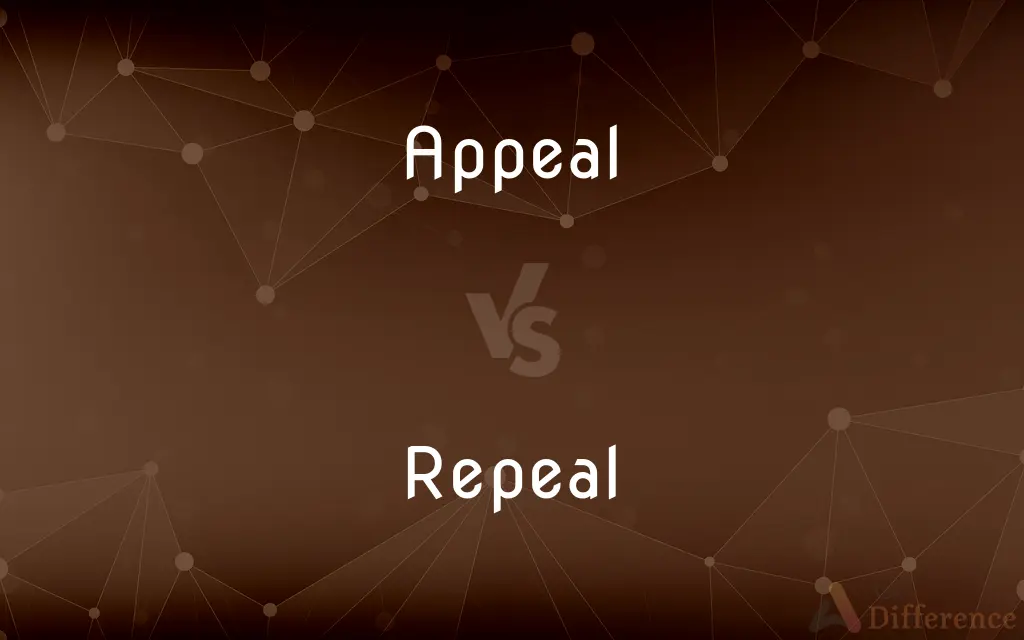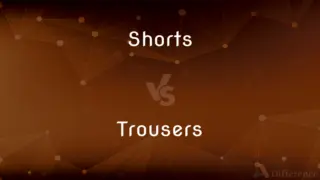Appeal vs. Repeal — What's the Difference?
By Tayyaba Rehman — Updated on October 6, 2023
Appeal is a request for a decision to be reviewed or reconsidered, while Repeal means to revoke or annul a law or act of legislation.

Difference Between Appeal and Repeal
Table of Contents
ADVERTISEMENT
Key Differences
An appeal and a repeal have fundamentally distinct purposes. An appeal is primarily a call to review or reconsider a judgment or decision, typically in the legal context. Repeal, on the other hand, denotes the process of withdrawing or annulling a law or regulation.
The word appeal can be versatile, applying not only in legal settings but also in general contexts. For instance, a person might appeal for kindness or support. Conversely, repeal is predominantly used in legislative or regulatory contexts, emphasizing the nullification or cancellation of a previously established law or rule.
To further differentiate, an appeal may not necessarily result in a change of the initial decision; it's a request for reevaluation. Whereas a repeal, by definition, signifies the removal or overturning of an existing statute or regulation.
When it comes to the process, an appeal involves presenting reasons to a higher authority to change a decision. Repeal, on the other hand, is more about the legislative process where lawmakers decide to remove a law due to various reasons, including it being outdated or no longer deemed necessary.
In common parlance, the two terms are used in their respective domains. One might hear about legal teams filing an appeal in court, while debates in legislative assemblies might center around the repeal of certain laws or regulations.
ADVERTISEMENT
Comparison Chart
Primary Definition
Request for review or reconsideration.
Revocation of a law or legislation.
Context of Use
Legal, general.
Legislative, regulatory.
Outcome
May or may not change the initial decision.
Removes or annuls a law.
Process
Involves presenting reasons for reconsideration.
Legislative process of removal.
Common Associations
Court decisions, general requests.
Laws, regulations, acts of legislation.
Compare with Definitions
Appeal
A serious or urgent request.
The mayor made an appeal for calm after the storm.
Repeal
To withdraw formally or officially.
The decision was made to repeal the company policy.
Appeal
A process of calling upon a person or entity to meet or satisfy a demand.
The community's appeal for funds was successful.
Repeal
To abolish or cancel something.
Activists urged the government to repeal the controversial measure.
Appeal
In law, an appeal is the process in which cases are reviewed by a higher authority, where parties request a formal change to an official decision. Appeals function both as a process for error correction as well as a process of clarifying and interpreting law.
Repeal
The action of revoking or annulling a law or act of Parliament.
The repeal of the act was celebrated by many.
Appeal
An earnest or urgent request, entreaty, or supplication.
Repeal
To revoke or annul a law by legislative act.
Congress voted to repeal the outdated law.
Appeal
A resort to a higher authority or greater power, as for sanction, corroboration, or a decision
An appeal to reason.
An appeal to her listener's sympathy.
Repeal
A repeal (O.F. rapel, modern rappel, from rapeler, rappeler, revoke, re and appeler, appeal) is the removal or reversal of a law. There are two basic types of repeal, a repeal with a re-enactment (or replacement) of the repealed law, or a repeal without any replacement.
Appeal
A higher court's review of the correctness of a decision by a lower court.
Repeal
Revoke or annul (a law or act of parliament)
The legislation was repealed five months later
Appeal
A case so reviewed.
Repeal
The action of revoking or annulling a law or act of parliament
The House voted in favour of repeal
Appeal
A request for a higher court to review the decision of a lower court.
Repeal
To revoke or rescind, especially by the action of a legislature.
Appeal
The power of attracting or of arousing interest
A city with special appeal for museumgoers.
Repeal
(Obsolete) To summon back or recall, especially from exile.
Appeal
To make an earnest or urgent request, as for help.
Repeal
The act or process of repealing.
Appeal
To have recourse, as for corroboration; resort
I appeal to your sense of justice.
Repeal
(transitive) To cancel, invalidate, annul.
To repeal a law
Appeal
(Law) To make or request an appeal.
Repeal
To recall; to summon (a person) again; to bring (a person) back from exile or banishment.
Appeal
To be attractive or interesting
The idea didn't appeal to me.
Repeal
To suppress; to repel.
Appeal
To request for an appeal of (a case) to a higher court for rehearing.
Repeal
An act or instance of repealing.
Appeal
(law)
Repeal
To recall; to summon again, as persons.
The banished Bolingbroke repeals himself,And with uplifted arms is safe arrived.
Appeal
An application to a superior court or judge for a decision or order by an inferior court or judge to be reviewed and overturned.
Repeal
To recall, as a deed, will, law, or statute; to revoke; to rescind or abrogate by authority, as by act of the legislature; as, to repeal a law.
Appeal
The legal document or form by which such an application is made; also, the court case in which the application is argued.
Repeal
To suppress; to repel.
Whence Adam soon repealedThe doubts that in his heart arose.
Appeal
A person's legal right to apply to court for such a review.
I have an appeal against the lower court decision.
Repeal
Recall, as from exile.
The tribunes are no soldiers; and their peopleWill be as rash in the repeal, as hastyTo expel him thence.
Appeal
(historical) An accusation or charge against someone for wrongdoing (especially treason).
Repeal
Revocation; abrogation; as, the repeal of a statute; the repeal of a law or a usage.
Appeal
(historical) A process which formerly might be instituted by one private person against another for some heinous crime demanding punishment for the particular injury suffered, rather than for the offence against the public; an accusation.
Repeal
The act of abrogating; an official or legal cancellation
Appeal
(historical) At common law, an accusation made against a felon by one of their accomplices (called an approver).
Repeal
Annul by recalling or rescinding;
He revoked the ban on smoking
Lift an embargo
Vacate a death sentence
Appeal
A call to a person or an authority for a decision, help, or proof; an entreaty, an invocation.
He made an appeal for volunteers to help at the festival.
Repeal
To rescind or revoke an existing rule or regulation.
The council decided to repeal the parking restrictions.
Appeal
(cricket) The act, by the fielding side, of asking an umpire for a decision on whether a batsman is out or not.
Appeal
(figuratively) A resort to some physical means; a recourse.
Appeal
(figuratively) A power to attract or interest.
Appeal
(rhetoric) A call to, or the use of, a principle or quality for purposes of persuasion.
Appeal
(historical) A summons to defend one's honour in a duel, or one's innocence in a trial by combat; a challenge.
Appeal
(law)
Appeal
(intransitive) Often followed by against (the inferior court's decision) or to (the superior court): to apply to a superior court or judge for a decision or order by an inferior court or judge to be reviewed and overturned.
Dissatisfied with the judge’s ruling, she decided to appeal.
He was advised by his lawyer to appeal against his conviction.
Appeal
To apply to a superior court or judge to review and overturn (a decision or order by an inferior court or judge).
The plaintiff appealed the decision to the appellate court.
Appeal
To accuse or charge (someone) with wrongdoing (especially treason).
Appeal
Of a private person: to instituted legal proceedings (against another private person) for some heinous crime, demanding punishment for the particular injury suffered.
Appeal
Of the accomplice of a felon: to make an accusation at common law against (the felon).
Appeal
(intransitive) To call upon a person or an authority to corroborate a statement, to decide a controverted question, or to vindicate one's rights; to entreat, to invoke.
Appeal
Of a fielding side; to ask an umpire for a decision on whether a batsman is out or not, usually by saying "How's that?" or "Howzat?".
Appeal
(intransitive) To call upon someone for a favour, help, etc.
I appeal to all of you to help the orphans.
Appeal
To have recourse or resort to some physical means.
Appeal
To be attractive.
That idea appeals to me.
Appeal
To summon (someone) to defend their honour in a duel, or their innocence in a trial by combat; to challenge.
Appeal
To make application for the removal of (a cause) from an inferior to a superior judge or court for a rehearing or review on account of alleged injustice or illegality in the trial below. We say, the cause was appealed from an inferior court.
Appeal
To summon; to challenge.
Man to man will I appeal the Norman to the lists.
Appeal
To invoke.
Appeal
To apply for the removal of a cause from an inferior to a superior judge or court for the purpose of reëxamination of for decision.
I appeal unto Cæsar.
Appeal
To call upon another to decide a question controverted, to corroborate a statement, to vindicate one's rights, etc.; as, I appeal to all mankind for the truth of what is alleged. Hence: To call on one for aid; to make earnest request.
I appeal to the Scriptures in the original.
They appealed to the sword.
Appeal
An application for the removal of a cause or suit from an inferior to a superior judge or court for reëxamination or review.
Appeal
A summons to answer to a charge.
Appeal
A call upon a person or an authority for proof or decision, in one's favor; reference to another as witness; a call for help or a favor; entreaty.
A kind of appeal to the Deity, the author of wonders.
Appeal
Resort to physical means; recourse.
Every milder method is to be tried, before a nation makes an appeal to arms.
Appeal
Earnest or urgent request;
An entreaty to stop the fighting
An appeal for help
An appeal to the public to keep calm
Appeal
Attractiveness that interests or pleases or stimulates;
His smile was part of his appeal to her
Appeal
(law) a legal proceeding in which the appellant resorts to a higher court for the purpose of obtaining a review of a lower court decision and a reversal of the lower court's judgment or the granting of a new trial;
Their appeal was denied in the superior court
Appeal
Request for a sum of money;
An appeal to raise money for starving children
Appeal
Take a court case to a higher court for review;
He was found guilty but appealed immediately
Appeal
Request earnestly (something from somebody); ask for aid or protection;
Appeal to somebody for help
Invoke God in times of trouble
Appeal
Be attractive to;
The idea of a vacation appeals to me
The beautiful garden attracted many people
Appeal
Challenge (a decision);
She appealed the verdict
Appeal
Cite as an authority; resort to;
He invoked the law that would save him
I appealed to the law of 1900
She invoked an ancient law
Appeal
A formal request to a higher court to review a decision.
The defendant filed an appeal against the verdict.
Appeal
The ability to attract or interest people.
The scenic view was of great appeal to tourists.
Appeal
An application to the public for support or involvement.
The charity's appeal raised thousands for the cause.
Common Curiosities
Is repeal specific to law and legislation?
Predominantly, yes. Repeal usually refers to the removal of laws or regulations.
Who generally has the authority to repeal a law?
Typically, a legislative body or government has the authority to repeal laws.
Can an appeal guarantee a changed decision?
No, an appeal is a request for review; the decision may or may not change.
How does an appeal differ from a complaint?
An appeal seeks review of a decision, while a complaint expresses dissatisfaction.
Can appeal be used outside of legal contexts?
Yes, appeal can denote a general request or attraction to people.
Can anyone file an appeal in court?
Generally, a party involved in a case or their legal representative can file an appeal.
What's another word for appeal in a legal context?
"Petition" can be synonymous in certain contexts.
Can a decision be repealed?
Decisions are generally appealed, not repealed. Laws or regulations are repealed.
Can a product have appeal?
Yes, if a product attracts or interests people, it's said to have appeal.
Does repeal always mean the complete removal of a law?
Typically, yes. Repeal signifies the full revocation or annulment of a law.
Do all legal decisions have a right of appeal?
Not always. Some decisions might be final without a right of appeal, depending on the jurisdiction.
If a law is repealed, does it have any effect retrospectively?
Typically, repeals have prospective effect, but some might be retroactive based on legislative intent.
Why might a law be repealed?
Reasons can include the law being outdated, unjust, or no longer necessary.
How does a repeal process typically begin?
It often begins with a proposal or bill in a legislative body to remove a specific law.
What's the opposite of repeal?
"Enact" or "institute" can be seen as opposites, referring to the establishment of laws.
Share Your Discovery

Previous Comparison
Shorts vs. Trousers
Next Comparison
Shocked vs. SurprisedAuthor Spotlight
Written by
Tayyaba RehmanTayyaba Rehman is a distinguished writer, currently serving as a primary contributor to askdifference.com. As a researcher in semantics and etymology, Tayyaba's passion for the complexity of languages and their distinctions has found a perfect home on the platform. Tayyaba delves into the intricacies of language, distinguishing between commonly confused words and phrases, thereby providing clarity for readers worldwide.















































